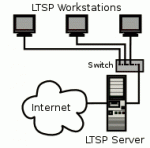 Mod_rewrite is Apache web server module that enables you to do behind scenes URL rewrite on your Apache powered web site. Using mod_rewrite you can make your site URL's user friendly and hide your site inner workings to increase security. Writing mod_rewrite rules requires some effort to master regular expressions and somewhat hairy mod_rewrite syntax. The whole process is much easier when you have insight to rewrite engine. In this article I'll show you how to debug Apache mod_rewrite by enabling logging feature while creating your rewrite rules.
Mod_rewrite is Apache web server module that enables you to do behind scenes URL rewrite on your Apache powered web site. Using mod_rewrite you can make your site URL's user friendly and hide your site inner workings to increase security. Writing mod_rewrite rules requires some effort to master regular expressions and somewhat hairy mod_rewrite syntax. The whole process is much easier when you have insight to rewrite engine. In this article I'll show you how to debug Apache mod_rewrite by enabling logging feature while creating your rewrite rules.
Category Archives: Linux
Latest Oracle (Sun) Java JDK and JRE 6 on Ubuntu operating systems
 Lets be honest, coding on Linux will probably include some Java based application like Eclipse or NetBeans. That's actually not a bad thing because we get to carry our development environment with us when using other proprietary operating systems. But since Oracle sliced "Operating System Distributor License for Java" and now nobody can legally host Java repository we have to install Java manually by downloading their JRE or JDK blob from Oracle servers. That isn't exactly hard thing to do but we don't want to give Oracle the pleasure of knowing that they made our already crowded day a little more complicated. So here I'm presenting work of excellent Debian packaging work by Janusz Dziemidowicz and a fellow open source enthusiast Martin Wimpress from Flexion.Org. These guys made it possible for us to create Java JDK 6 and JRE 6 deb packages and create local Java repository our selves.
Lets be honest, coding on Linux will probably include some Java based application like Eclipse or NetBeans. That's actually not a bad thing because we get to carry our development environment with us when using other proprietary operating systems. But since Oracle sliced "Operating System Distributor License for Java" and now nobody can legally host Java repository we have to install Java manually by downloading their JRE or JDK blob from Oracle servers. That isn't exactly hard thing to do but we don't want to give Oracle the pleasure of knowing that they made our already crowded day a little more complicated. So here I'm presenting work of excellent Debian packaging work by Janusz Dziemidowicz and a fellow open source enthusiast Martin Wimpress from Flexion.Org. These guys made it possible for us to create Java JDK 6 and JRE 6 deb packages and create local Java repository our selves.
Ubuntu LTSP server for booting thin clients over network using PXE
 Not so long ago I've discovered few bad sectors on one of my machines hard disk. The failing component warranty hasn't expired but I was reluctant to take it back to my hardware dealer because that would make this machine unusable until the whole process is finished. Hard disk device in question is currently in my hardware dealers hands an I'm waiting for replacement but that hasn't stopped me from writing this article using diskless machine in question. In this article I'll show you how to install LTSP (Linux Terminal Server Project) on your Ubuntu PC and how to configure this system for booting thin clients over network using PXE (Preboot Execution Environment).
Not so long ago I've discovered few bad sectors on one of my machines hard disk. The failing component warranty hasn't expired but I was reluctant to take it back to my hardware dealer because that would make this machine unusable until the whole process is finished. Hard disk device in question is currently in my hardware dealers hands an I'm waiting for replacement but that hasn't stopped me from writing this article using diskless machine in question. In this article I'll show you how to install LTSP (Linux Terminal Server Project) on your Ubuntu PC and how to configure this system for booting thin clients over network using PXE (Preboot Execution Environment).
Manage GSM mobile broadband connections without Network Manager (Red Hat Linux, CentOS, Fedora)
 In my last article I have described how to manage manage GSM mobile broadband connections without Network Manager on Debian based distributions like Ubuntu and Linux Mint.
In my last article I have described how to manage manage GSM mobile broadband connections without Network Manager on Debian based distributions like Ubuntu and Linux Mint.
In this article I will show you how to do the same on Red Hat Linux based Linux operating systems like CentOS and Fedora. I recommend that you read "Introduction" and "My hardware and ISP configuration" paragraphs from my last article to get acquainted with my exact hardware and Internet Service Provider configuration. Required procedure is a bit simpler for Red Hat Linux, CentOS and Fedora because there is some abstraction in accessing basic pppd options. Also Red Hat network configuration files are differently arranged (better than Debian in my opinion) and because of all that this article is a bit simpler to follow than it's Debian counterpart.
Continue readingManage GSM mobile broadband connections without Network Manager (Ubuntu, Linux Mint, Debian)
 Recent Network Manager versions like Network Manager 0.9.1 from Ubuntu 11.10 and Network Manager 0.9.2 from Fedora 16 and aren't working well with both of my GSM mobile broadband modems, Huawei E220 and ZTE MF100. Actually this aren't first Network Manager version that refuse to work with the same hardware, there were some problems back in the good old Ubuntu 9.10 days. Because of that I had to learn managing my mobile broadband network connections without Network Manager. In this article I will do my best to point you in the right direction to managing your GSM mobile broadband connections from terminal without Network Manager on Ubuntu, Linux Mint and Debian based operating systems.
Recent Network Manager versions like Network Manager 0.9.1 from Ubuntu 11.10 and Network Manager 0.9.2 from Fedora 16 and aren't working well with both of my GSM mobile broadband modems, Huawei E220 and ZTE MF100. Actually this aren't first Network Manager version that refuse to work with the same hardware, there were some problems back in the good old Ubuntu 9.10 days. Because of that I had to learn managing my mobile broadband network connections without Network Manager. In this article I will do my best to point you in the right direction to managing your GSM mobile broadband connections from terminal without Network Manager on Ubuntu, Linux Mint and Debian based operating systems.